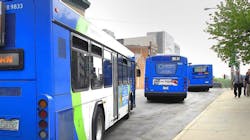Illinois awards more than $112 million to downstate transit providers
The Illinois Department of Transportation (IDOT) awarded $112.5 million to 31 downstate transit providers through a capital program that was part of the $45-billion Rebuild Illinois legislation that passed into law in 2019.
The legislation included more than $355 million to support downstate transit agencies and the $112 million awarded Nov. 13 is the first of three rounds of grants to distribute the funding. The next call for proposals in 2021 and 2023 will distribute the remaining funds.
“Over the next five years, downstate communities will receive $121 million to improve and expand transit services – that’s on top of the work that’s already been done in year one, which delivered $2.7 billion in improvements to over 1,700 miles of highway and over 120 bridges statewide. These projects will improve the quality of life for downstate residents and provide good jobs to grow our economy in every region,” said Illinois Gov. J.B. Pritzker.
IDOT says the funds awarded on Nov. 13 will be used to expand and improve service, which will provide more transportation options and promote an enhanced quality of life in communities throughout the state.
The funds were awarded to 19 rural transit providers and 12 urban transit providers who will use the grants to purchase new vehicles and other equipment, as well as for the construction of new bus shelters, stations and maintenance facilities.
“Transit in our downstate communities can be a lifeline for getting to work or school, a doctor’s appointment or a trip to the grocery store,” said Acting Transportation Secretary Omer Osman. “This funding through Rebuild Illinois means these providers finally will have the resources they need to improve service in communities that have not seen this type of investment for many years.”
Rural transit providers account for $24.96 million of the grants. The largest of the rural grants went to Rides Mass Transit District, which serves the Carbondale area. The transit district will use its $9.8-million grant to upgrade information technology items, construct three facilities, purchase bus and maintenance equipment and shelters.
Another highlight from the rural transit grants is the $505,494 grant awarded to Kendall County, which will be used to purchase a bus surveillance system, two medium-duty paratransit buses, new radios and to engineer and design a new bus terminal for Kendall Area Transit.
Urban transit providers account for $87.55 million of the grants. The largest of these grants was awarded to Greater Peoria Mass Transit District (GPMTD) for $16.75 million. The funds will be used to construct a new facility and make improvements to pre-engineered buildings. GPMTD will also use the grant to purchase equipment to improve day-to-day operations of the system such as a driver simulator, bus camera system, driver barriers and new fareboxes.
Connect Transit received a $9.92-million grant that will be used to expand and improve service in downtown Bloomington, purchase four 35-foot electric buses and help complete an additional 90 bus stops as part of its Better Bus Stops for Bloomington-Normal campaign.
“We are very pleased and gratified to receive this additional funding commitment from the state of Illinois. This takes us one step closer toward realizing our dream of a new Downtown Bloomington Transfer Center,” stated Chairman Ryan Whitehouse.
The Downtown Bloomington Transfer Center will serve 10 bus routes, offer riders protection from weather and provide improved safety, access, amenities and transit service. Connect Transit also received an $8-million grant from the Federal Transit Administration this year for the project.
A complete list of local providers and awards can be viewed at https://idot.click/rbi-capital-plantransit-grants.
About the Author

Mischa Wanek-Libman
Group Editorial Director
Mischa Wanek-Libman is director of communications with Transdev North America. She has more than 20 years of experience working in the transportation industry covering construction projects, engineering challenges, transit and rail operations and best practices.
Wanek-Libman has held top editorial positions at freight rail and public transportation business-to-business publications including as editor-in-chief and editorial director of Mass Transit from 2018-2024. She has been recognized for editorial excellence through her individual work, as well as for collaborative content.
She is an active member of the American Public Transportation Association's Marketing and Communications Committee and served 14 years as a Board Observer on the National Railroad Construction and Maintenance Association (NRC) Board of Directors.
She is a graduate of Drake University in Des Moines, Iowa, where she earned a Bachelor of Arts degree in Journalism and Mass Communication.
